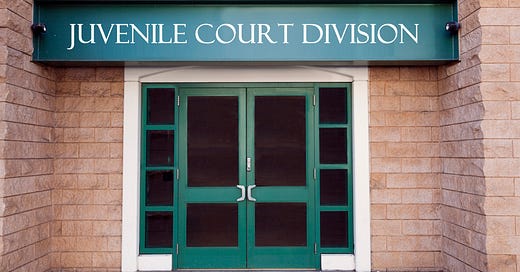The Juvenile Court System
The American court has important differences between the juvenile and adult court system. While both courts may appear similar, “the tasks of juvenile and adult courts are not the same,” (Neubauer & Fradella, Ch. 4–8). Juvenile courts specialize in “helping the child,” ensuring the court sentence is benevolent in restoring the accused; unlike pursuing retribution or legal incapacitation in adult courts. Similar to adult courts, “[j]uveniles have a right to appeal in nearly all states,” (Neubauer & Fradella, 4–9k).
Juvenile proceedings are more informal than typical courtrooms; allowing for more elasticity than adult criminal trials. In juvenile courts, “charging occurs during the intake decision;” therefore “[l]ess serious cases are nonpetitioned and handled informally,” (Neubauer & Fradella, Ch. 4–12).
Frequency and severity of committed offenses committed by a juvenile are moot. After age eighteen, every person starts over without a prior record, (Neubauer & Fradella, 4–2c).
Third, adjudicatory hearings replace adult trials; juveniles are not arrested, but summoned, by a request to appear in court for proceedings on a certain date and time. Juvenile courts base their process on civil law, rather than criminal law; assessing cases using three classifications: (1) delinquents; (2) status offenses; and (3) child victims, (Neubauer & Fradella, Ch. 4–12). This “determine[s] whether the allegations contained in the petition are supported by a ‘preponderance of the evidence’ (for status offenses) or ‘beyond a legal doubt’ (for juvenile delinquency),” (Neubauer & Fradella, Ch. 4–9i).
Fourth, juvenile court proceedings are conducted in secret—converse to public adult trials. This ensuring that juveniles are able to keep their identities private. Additionally, confidentiality allows the court’s sentencing to be restorative; deterrence through incapacitation is not an option for non-violent juvenile offenders. Here, the conference is held, “roughly equivalent to a preliminary hearing in an adult proceeding,” (Neubauer & Fradella, 4-9f).
Fifth, “jury trials are not allowed,” (Neubauer & Fradella, Ch. 4–12). Judicial discretion is instead utilized, “throughout the juvenile court process . . . plea bargaining by a different name,” (Neubauer & Fradella, Ch. 4-9h). This practice allows for the specialization of judgment; in a manner benevolent to the individual.
The juvenile court system is consistent with the moral principles found in the Old Testament, whereby Solomon scribed “[s]tart children off on the way they should go, and even when they are old they will not turn from it,” (Proverbs 22:6; NIV). Moreover, that courts should “[d]iscipline your children while there is hope. Otherwise you will ruin their lives,” (Proverbs 19:18; NLT). The absence of a jury in juvenile proceedings ensure that (1) the sentence is restorative; (2) the proceedings generally remain informal; (3) the court proceedings adhere to the process of civil law; and (4) the court proceedings remain confidential to the child’s identity.
Conclusion
Juvenile courts are important because a distinction must be made between children and adults when considering the sentencing for criminal cases. Unlike adult criminal cases where the members of the court follow traditional legal process; in juvenile courts, legal professionals “rely heavily” on non-lawyers for judgments and assessments (Neubauer & Fradella, Ch. 4-8). Thus, restorative measures are better suited to address disparities in juvenile sentencing.
Bibliography
Neubauer, D.; Fradella, H. (2017, 2019). America’s Courts and the Criminal Justice System. Cengage Publishing.
NIV. Proverbs 22:6
NLT. Proverbs 19:18



